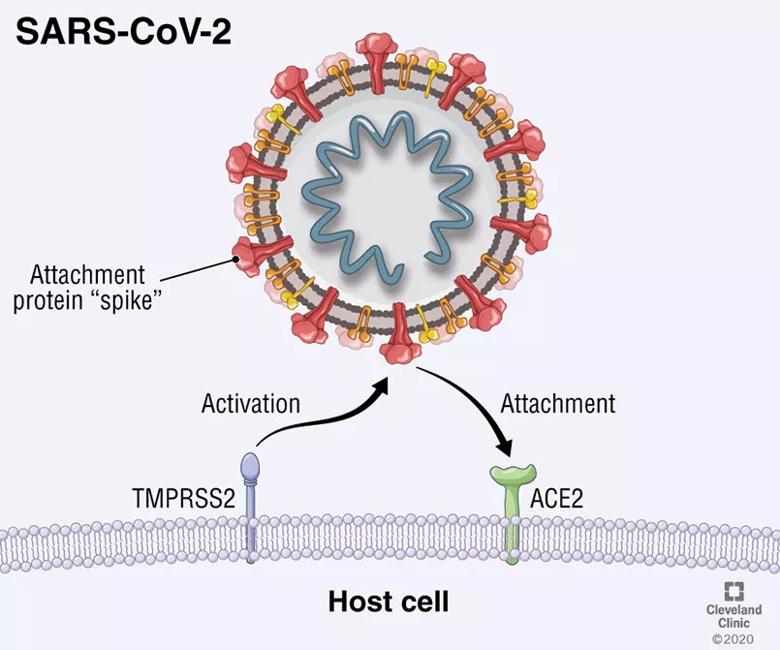Cleveland Clinic researchers explore enterprise-wide testing registry to investigate
An Italian-led study published earlier this year reported that androgen deprivation therapy (ADT) may play a protective role against the risk of SARS-CoV-2 infection and may explain, in part, why men are at higher risk for developing COVID-19.
Advertisement
Cleveland Clinic is a non-profit academic medical center. Advertising on our site helps support our mission. We do not endorse non-Cleveland Clinic products or services. Policy
A team of Cleveland Clinic researchers set out to validate this report using a prospective registry of patients who were tested for SARS-CoV-2. They assessed the relationship between those who received ADT and outcomes related to the rate of positive tests and levels of disease severity.
Their findings were recently reported in The Journal of Urology.
Eric A. Klein, MD, Chair of the Glickman Urological & Kidney Institute at Cleveland Clinic and first author of the study, notes that their investigation aimed to assess a potential biologic intersection between the host co-receptors — ACE2 and TMPRSS2 — both of which allow entry points for SARS-CoV-2. After the spike protein, characteristic of the virus, binds to the ACE2 receptor, TMPRSS2 cleaves the spike protein between its two subunits, allowing the viral membrane to fuse with the cellular membrane and injecting its genetic material into the cell (Image).
“This is really interesting from a prostate cancer perspective because TMPRSS2 is involved in one of the most common genomic changes in early-stage prostate cancer,” explains Dr. Klein. TMPRSS2 fuses with the ERG family of genes, known to drive cellular proliferation, and thus initiating prostate cancer.

Image. ACE2 and TMPRSS2 both allow entry points for SARS-CoV-2. After the spike protein binds to the ACE2 receptor, TMPRSS2 cleaves the spike protein between its two subunits, allowing the viral membrane to fuse with the cellular membrane and injecting its genetic material into the cell.
Advertisement
Whether it’s delivered medically or surgically, ADT turns off TMPRSS2 in the prostate, making prostate cancer regress. Because of this, it was hypothesized that perhaps ADT could function similarly for patients at risk for SARS-CoV-2 or mitigate pathogenesis of the disease.
“Given the previous report, it seemed possible that ADT could play a protective role against infection or play a mitigating role in the severity of symptoms,” says Dr. Klein. “So we queried our robust testing registry to determine if our institutional experience paralleled the findings of the Italian study.”
The study cohort included 1,779 men with prostate cancer from a total tested population of 74,787, of whom 4,885 (6.5%) were positive for SARS-CoV-2. Of those with prostate cancer, 102 (5.7%) were SARS-CoV-2 positive and 304 (17.1%) were on ADT. Among those receiving ADT, 5.6% were positive as compared to 5.8% not receiving ADT.
“We performed our own study with the goal of replicating what was previously reported in the Italian study, but we were not able to reproduce their findings,” says Dr. Klein. This, despite having more than 10 times the number of prostate cancer patients and controlling for known risk factors including smoking, asthma, diabetes and other comorbidities.
Nima Sharifi, MD, Director of the Center for Genitourinary Malignancies Research at Cleveland Clinic and co-author of the study, remarks that the team will continue to pursue research at the intersection of COVID-19 and prostate cancer. “We are very interested in the sex-discordant COVID-19 outcomes, and our ongoing studies are aimed at determining whether and how androgens regulate cellular SARS-CoV-2 receptors and other regulators of infection.”
Advertisement
Dr. Klein concludes, “We know these two diseases share the same receptor. But, at this point, it’s not clear if there is any biological cross-talk or shared therapeutic effect of ADT. There are a number of clinical trials in place around the world to address this, and we plan to continue exploring possible connections as more data become available.”
Advertisement
Advertisement

First-of-its-kind research investigates the viability of standard screening to reduce the burden of late-stage cancer diagnoses

Global R&D efforts expanding first-line and relapse therapy options for patients

Study demonstrates ability to reduce patients’ reliance on phlebotomies to stabilize hematocrit levels

A case study on the value of access to novel therapies through clinical trials

Findings highlight an association between obesity and an increased incidence of moderate-severe disease

Cleveland Clinic Cancer Institute takes multi-faceted approach to increasing clinical trial access 23456

Key learnings from DESTINY trials

Overall survival in patients treated since 2008 is nearly 20% higher than in earlier patients